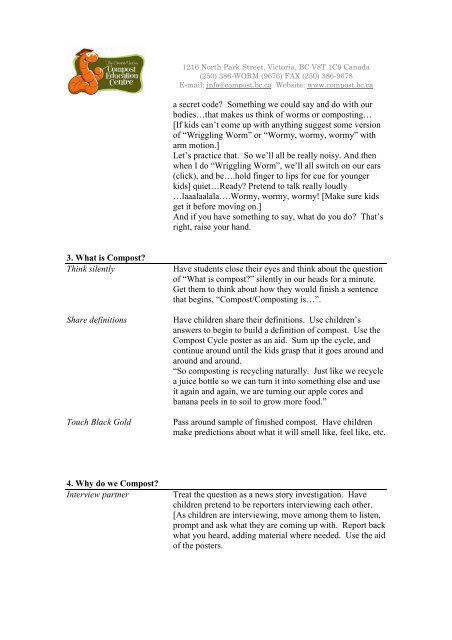Wrigglers At Work Worm Composting Lesson Plan - The Greater ...
Wrigglers At Work Worm Composting Lesson Plan - The Greater ...
Wrigglers At Work Worm Composting Lesson Plan - The Greater ...
Create successful ePaper yourself
Turn your PDF publications into a flip-book with our unique Google optimized e-Paper software.
1216 North Park Street, Victoria, BC V8T 1C9 Canada<br />
(250) 386-WORM (9676) FAX (250) 386-9678<br />
E-mail: info@compost.bc.ca Website: www.compost.bc.ca<br />
a secret code? Something we could say and do with our<br />
bodies…that makes us think of worms or composting…<br />
[If kids can’t come up with anything suggest some version<br />
of “Wriggling <strong>Worm</strong>” or “<strong>Worm</strong>y, wormy, wormy” with<br />
arm motion.]<br />
Let’s practice that. So we’ll all be really noisy. And then<br />
when I do “Wriggling <strong>Worm</strong>”, we’ll all switch on our ears<br />
(click), and be….hold finger to lips for cue for younger<br />
kids] quiet…Ready? Pretend to talk really loudly<br />
…laaalaalala….<strong>Worm</strong>y, wormy, wormy! [Make sure kids<br />
get it before moving on.]<br />
And if you have something to say, what do you do? That’s<br />
right, raise your hand.<br />
3. What is Compost?<br />
Think silently Have students close their eyes and think about the question<br />
of “What is compost?” silently in our heads for a minute.<br />
Get them to think about how they would finish a sentence<br />
that begins, “Compost/<strong>Composting</strong> is…”.<br />
Share definitions Have children share their definitions. Use children’s<br />
answers to begin to build a definition of compost. Use the<br />
Compost Cycle poster as an aid. Sum up the cycle, and<br />
continue around until the kids grasp that it goes around and<br />
around and around.<br />
“So composting is recycling naturally. Just like we recycle<br />
a juice bottle so we can turn it into something else and use<br />
it again and again, we are turning our apple cores and<br />
banana peels in to soil to grow more food.”<br />
Touch Black Gold Pass around sample of finished compost. Have children<br />
make predictions about what it will smell like, feel like, etc.<br />
4. Why do we Compost?<br />
Interview partner Treat the question as a news story investigation. Have<br />
children pretend to be reporters interviewing each other.<br />
[As children are interviewing, move among them to listen,<br />
prompt and ask what they are coming up with. Report back<br />
what you heard, adding material where needed. Use the aid<br />
of the posters.


